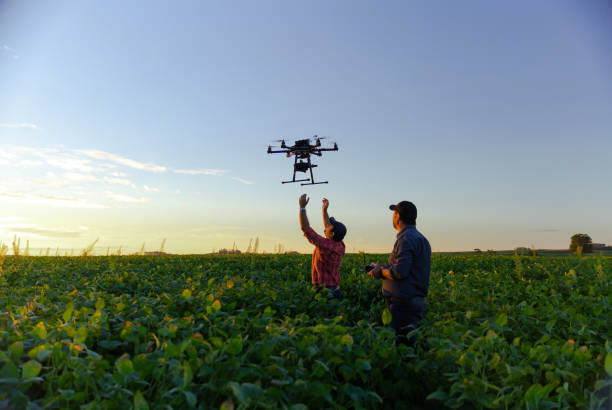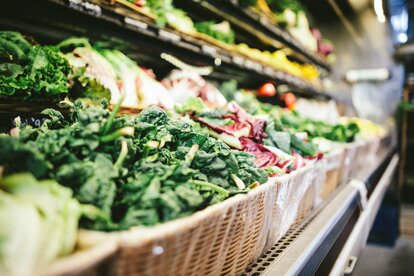Digitalize Food Systems
Planting the Seeds for a Better Future: Inclusive Innovation in Global Food Systems

The global food system is frequently rattled by economic, political, and environmental shocks. The COVID-19 pandemic created an economic environment that pushed millions of people into severe malnutrition, food insecurity, and starvation. The ongoing Russian invasion of Ukraine has raised food prices globally. The impacts of the climate crisis continue to put food production at risk.
The World Economic Forum has highlighted that 3 billion people cannot afford a healthy diet, and 1.5 people cannot afford meals that meet baseline nutritional needs.
Ending world hunger will be one of the biggest challenges the global community will face within the next few decades. How, then, can G20 leaders move forward to create resilient food systems in the wake of geopolitical uncertainty?
Experts argue that the transformation of food systems through inclusive innovation is needed.
The Center for Indonesian Policy Studies (CIPS) hosted a Think20 (T20) Policy Roundtable event titled “Advances in the Food Systems Through Digital Technology and Innovation”, which discussed the need for inclusive digitalization in food systems to build resiliency and sustainability.
The panel was moderated by Azizah Fauzi, a Junior Researcher at CIPS, who facilitated a discussion among four experts in the field:
-
Prof. Dr. Ir. Damayanti Buchori, M.Sc – Lead Co-Chair of the T20 Task Force on Food Security and Sustainable Agriculture.
-
Malikul Ikram, Ph.D. – Director of Research and Development of PT. BIOPS Agrotekno Indonesia.
-
Dr. Heike Baulmüller – Senior Researcher and PARI Coordinator of Center for Development Research (ZEF).
-
Dr. Dil Rahut – Vice-Chair of Research and Senior Research Fellow of Asian Development Bank Institute (ABDI).

Three of the four experts on screen along with the moderator of the T20 Policy Roundtable.
Food Systems
Buchori emphasized the importance of food systems, which act as the nexus points that interconnect food security, nutrition, and human health. The term itself refers to a collection of activities, including production, processing, transportation, and consumption.
Buchori argued that the transformation of food systems is needed to achieve the 2030 Sustainable Development Goals (SDGs). In fact, food systems have broader socioeconomic implications– their breakdown threatens the lives and well-being of billions of people.
Buchori underscored five areas of focus to transform food systems:
1. Shift to sustainable food for all.
2. Shift to a healthy consumption pattern.
3. Boost nature-positive production.
4. Advance equitable livelihood.
5. Build resilience to shocks, stresses, and vulnerability.
But how, exactly, can such a transformation take place? Experts propose that food systems should be transformed through digitalization.
Why Digitalization in Food Systems?
Buchori argued that digitalization in agricultural sectors will increase efficiency, productivity, and sustainability throughout the value chain. Moreover, digital technology improves the resilience of food systems by equipping them to withstand environmental and geopolitical uncertainties.
The movement towards more technologically-focused agricultural practices has been termed “Agriculture 4.0” or “smart farming.” These revolutionary innovations produce better information to make timely decisions with more predictable outcomes.
Buchori referred to this agricultural revolution as a two-phase coin. On one hand, digitalization can help increase equality. On the flip side, if this digitalization is mismanaged, an increase in the digital divide will further inequality between countries.
The digitalization of food systems must be pursued with inclusivity in mind to lessen the digital divide, rather than further it.
Technologies to Improve Food Systems
Global agricultural practices use roughly 70% of the available freshwater in the world, but up to 40% of this water is wasted, according to Ikram.
Ikram advocated for the adoption of smart irrigation systems that offer a solution to agricultural water waste. Smart irrigation systems can sense environmental conditions such as humidity and rain and then calculate how much water is required for crops.
Digitalization can also be useful at the levels of production and distribution.
Growth lights can optimize growing conditions, cameras and drones can mitigate pests and detect diseases, gas sensors can prevent the spread of foodborne illnesses, freeze-drying technology can increase the longevity of crop yields, and procurement services and e-commerce activities help link producers to the market and buyers more directly.
These digital transformations create interconnection, traceability, security, and efficiency, according to Baulmüller.
“The human dependency is significant. Meanwhile, the regeneration of farmers is slow.”
Ikram emphasized that these innovations will make the lives of farmers easier– not take away their jobs, but remove some of the drudgeries from their work, giving them the ability to keep up with food demands.
However, these smallholder farmers are unable to afford these innovations– at least not yet.

unsplash/Scott Warman
What is Still Needed
Affordability continues to be a primary concern. Rahut advocated for these innovations to be scaled out on a hiring or rental basis, which would help ease the financial barriers that farmers face. Ikram added that profit-sharing and community-building to foster partnerships would help ease constraints.
Rahut argued that capacity is also a necessary consideration; even if smallholder farmers can afford certain agricultural technologies, they may not have the capacity to do so.
Ikram, Baulmüller, and Rahut underscored the infrastructural barriers that farmers face. High-speed internet coverage and information and communications technologies (ICT) infrastructure need to be expanded in farming areas.
Not only is coverage itself needed, but this internet coverage needs to be used well. This can be done through affordability, skill development, digital literacy, education, and the inclusion of women in these agricultural processes.
Moving Forward
The transformation of food systems is imminent within the next several decades, as food systems sit at the heart of an array of pressing issues facing the global population.
This transformation requires innovation from farm to table. Transforming food systems requires precautionary principles such as local contexts, social structures, and values to be considered– and smallholder farmers require the attention of G20 leaders in this discussion.
Digitalization sits at the crux of this transformation. Moving forward, G20 leaders must be committed to global consolidation and inclusive development in food systems to avoid further entrenching divides. The creation of food-related policies is needed to protect the rights and promote the well-being of all stakeholders.
To watch the full panel discussion, click here.
– – –
Written by Keiran Ellis.
The Center for Indonesian Policy Studies (CIPS) is an independent, non-profit, and non-partisan think tank that advocates for practical policy reforms informed by evidence-based policy research and analysis. Find out more here.
